Former UNC basketball coach Matt Doherty opens up about stormy tenure with Tar Heels
Former UNC basketball coach Matt Doherty has written a leadership book that has one goal above all others. What is it?
“To help people avoid all the landmines that I stepped on,” Doherty said.
I read “Rebound: From Pain to Passion” in a single day. Doherty in the book goes into greater detail than he ever has before about what went wrong during his tumultuous three-year reign as the Tar Heels’ head coach (2000-2003) and about the lessons he learned.
If you’re a fan of sports history, it’s riveting. It made me want to ask Doherty a lot of follow-up questions, too, and you’ll see those answers below.
In the book, Doherty points out many of his own mistakes throughout his years as head coach, including the fact that he didn’t retain Phil Ford and the other Tar Heel assistant coaches when he was first hired.
Doherty now believes he should have kept all of the old UNC assistants, and that he also moved too fast when he first got the job, making too many wholesale changes too quickly. Doherty writes that the first 90 days in a new job set the standard for all that comes after that, and that first impressions are hard to undo.
Doherty didn’t use a ghostwriter for the book, and that worked out fine. The book feels honest. It sounds just like the former coach talks, including his fondness for acronyms and exclamation points.
Doherty discusses some of his heat-of-the-moment mistakes, too, such as when he told his players in a court huddle late in a 2001 UNC-Duke game: “One thing hasn’t changed… Duke still has the ugliest cheerleaders in the ACC!”
One of the most intriguing sections comes when Doherty dissects his relationship with his late coach and mentor Dean Smith. He delves into his love for the man who recruited him as both a player for the 1982 national championship UNC team and later as the Tar Heels’ head coach — but also his pain when he felt like Smith didn’t do more to save him from losing his job. Roy Williams took over in 2003 after Doherty was forced to resign and has been UNC’s head basketball coach ever since, winning three national championships.
Doherty, 58, now lives in Mooresville, about 30 miles north of Charlotte. He does some executive coaching, speaks to corporations about leadership and has a couple of weekly radio gigs in Charlotte. He also freely admits to missing coaching. His most recent coaching job came at SMU, where he was the head coach for six seasons before getting fired in 2012.
“Coaching basketball is my drug,” Doherty said. “I joke and say I’m in rehab right now. ... But I’d never say never. Listen, if somebody can be the president of the United States at 78, I think I could be a head coach again at 58. Or maybe an assistant, for a head coach I know and respect.”
Here are excerpts of my recent question-and-answer session with Doherty, edited for clarity and brevity.
Scott Fowler: Your former college teammate Michael Jordan, now the owner of the Charlotte Hornets, doesn’t write the foreword for a lot of books. But he wrote this one. Was it difficult to persuade him to do so?
Matt Doherty: I never like to ask Michael for favors. But this one was for me. And it was meaningful. And so I texted him and he texted me back probably in 20 minutes and said, “Yeah, no problem — when do you need it by?” And that meant a lot to me that he would do that. But that’s his loyalty to a former teammate.
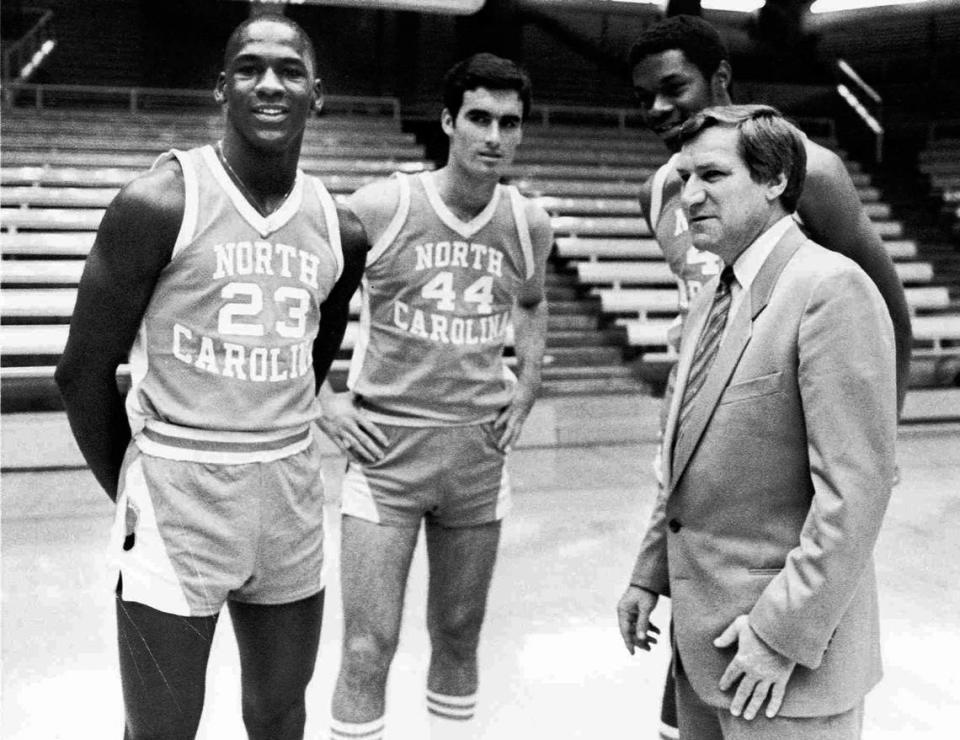
SF: You write a lot about the late Dean Smith, UNC’s legendary head coach for 36 years and a man who was still heavily involved in the program for years after that. He recruited you as a player. And then, in 2000 you were head coach at Notre Dame, he recruited you again to come take over the program after Roy Williams initially turned the job down.
This was a loving relationship, but also a complicated one. Explain it.
MD: My life is better because of Dean Smith, because I got to play there and learn so many lessons. In my leadership practice, I’m constantly referring to him. It’s like when we become parents, and we end up talking like our parents.
... Listen, none of us are perfect. And I think when someone like Dean Smith or Billy Graham passes away, we want to put them up (on a pedestal). And they deserve to be up there, but they aren’t perfect. We are all flawed human beings.
And I think that was probably coach’s flaw: He recruited me (to coach UNC) but he wanted control. He retired, but he wanted to coach. And that was his inner struggle. And I was caught in the middle of it.
And I wasn’t experienced enough or wise enough to manage that relationship. And for a long time. I just feel like, “How stupid was I, not to understand how to manage that relationship?”
But that’s why I go in the book and talk about if someone (Smith) tells me, “It’s your program; run it how you see fit,” I take that for face value as opposed to doing a deeper dive and realizing OK, he said that, but he doesn’t really mean it.
So I’ve got to manage Coach Smith in this process delicately. But it was such an awkward relationship, because I always felt the player-coach relationship ... I should have (called Smith more). I didn’t understand his need to still be emotionally involved on a day-to-day basis.
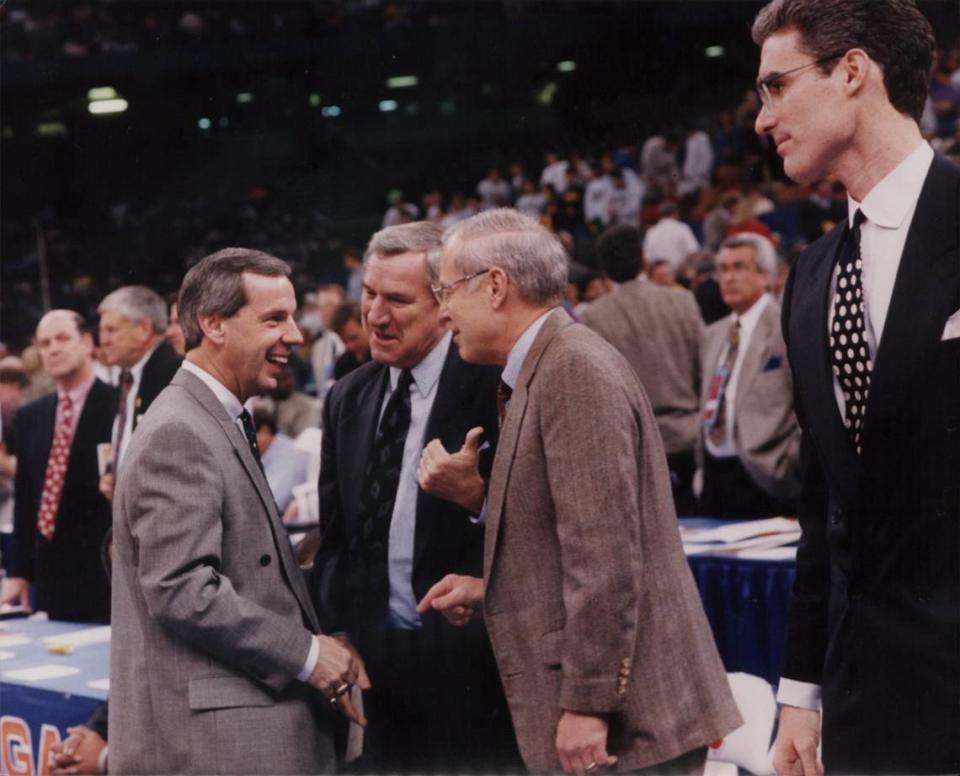
SF: You don’t back away at all in the book from the years of hurt you experienced after being forced to resign at UNC.
At one point you write: “Why did it happen? Should I have stayed at Notre Dame? Why did they publicly shame me? …. I didn’t want people to see me broken. But I was! I had a difficult time sleeping. I would often dream of coaching UNC or conversations I might have with Dean Smith and Roy Williams.”
Did you ever have those conversations?
MD: There were many times I’d pick up the phone and hang it up, you know. And then finally (in 2009, six years after his resignation) I said, “I’ve gotta do this. This is not good.”
And Coach Williams was willing to meet with me. And Coach Smith, by that time, was not healthy enough to meet with me. (Smith suffered from dementia in the final years of his life and died in 2015.) ... My meeting with Coach Williams was probably an hour. And it was good.
You know whenever you have issues or conflict in a family, the best thing to do is talk about it. But it’s very hard, especially when you’re talking about male egos.
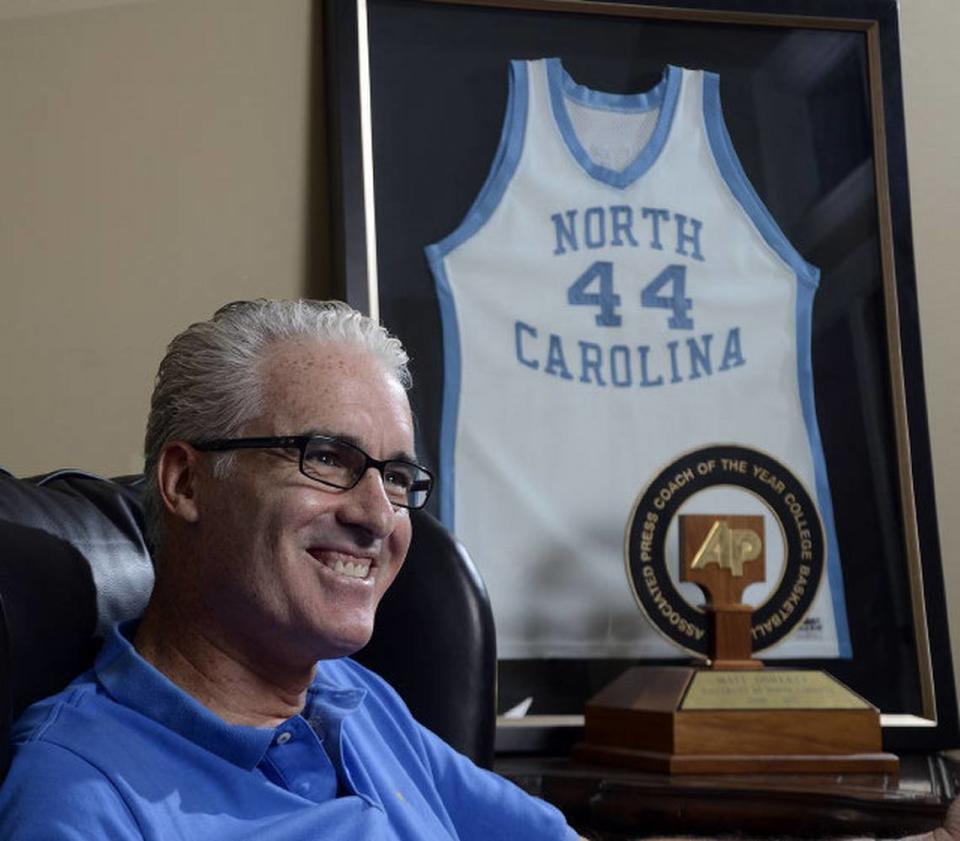
SF: In retrospect, should you have just stayed as the head coach at Notre Dame and not come to UNC at all?
MD: I thought of that. I told Dick Baddour (UNC’s athletic director at the time) that if I can’t bring my staff with me, I’ll stay at Notre Dame. And I thought about staying at Notre Dame until Michael (Jordan) called.
What pushed me was my love for North Carolina. I didn’t want someone outside the family, especially Rick Majerus, coaching our team. (Doherty writes that Jordan told him that Majerus would likely be hired in an “outside the family” move if Doherty didn’t come to Chapel Hill). Coach Smith knew what button to push, and they pushed it.
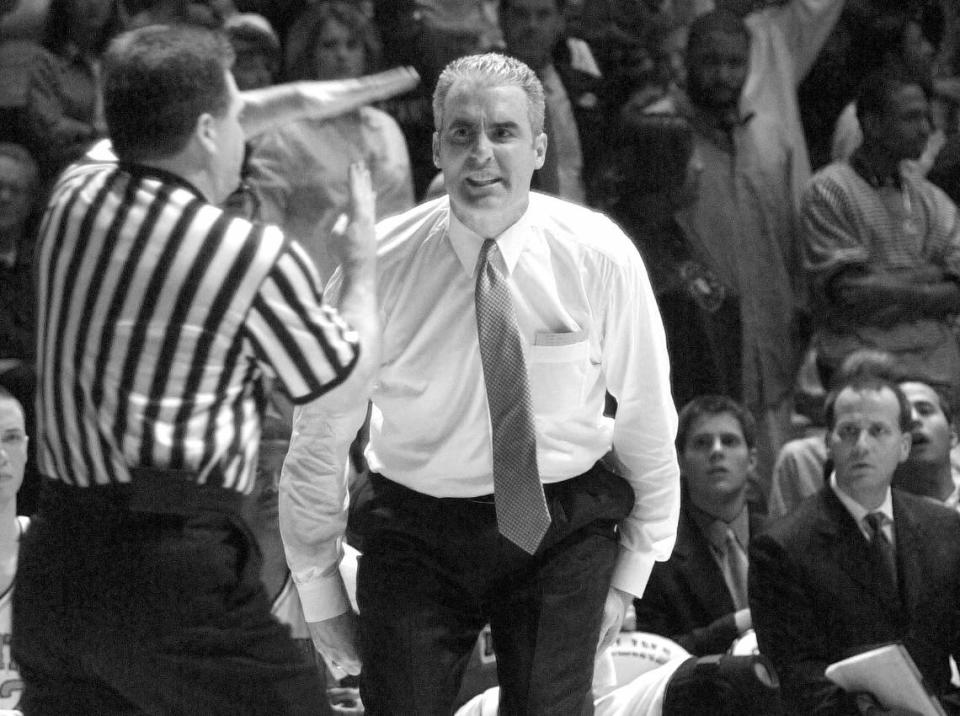
SF: Speaking of assistant coaches, that has long been a sticking point with UNC people. By bringing in your Notre Dame assistants, you basically pushed the current Tar Heel assistants, including beloved former player Phil Ford, out the door. How would you have handled that if given another chance?
MD: I should have figured out a plan with Coach Smith and Dick Baddour. I should have retained Phil, Dave Hanners and Pat Sullivan and still brought my assistants with me (but in lesser positions).
As I say in the book, I should have worked out something with my (Notre Dame) assistants and said: “Hey, listen. I’m not leaving you out in the cold. You’re not going to have the roles that you had previously but you’ll have the same salary. You’ll have a job.” ... That would have been the wisest thing to do. My assistants may not have liked it, but I would have been protecting them long term, because I wouldn’t have been throwing them to the wolves.
SF: You write in the book that you were a “young, immature coach trying to connect” with your players when you made the “Duke still has the ugliest cheerleaders” comment, and that you eventually wrote letters of apology to Mike Krzyzewski and Duke’s cheerleading coach. That cheerleading coach then called you and left a message. What was that like?
MD: I was very nervous when I had to return her call, like “Oh gosh, this is not going to be good.” She turned out to have been a cheerleader (at UNC) on the 1982 national championship team. We were in school together and had some business classes together. She was very forgiving of me, thank goodness.
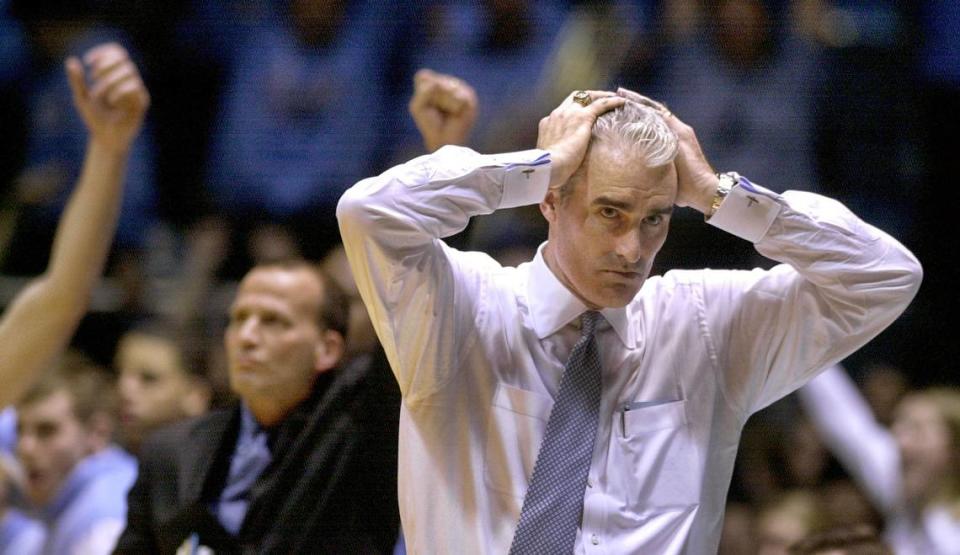
SF: That was obviously a mistake you made. Do you now consider the time you and Duke assistant coach Chris Collins had a chest-to-chest confrontation (in 2003) a mistake, or not?
MD: I think he needed to be confronted, but maybe not face-to-face. ... If I had reacted better, then maybe we wouldn’t have had a pushing match in front of the bench that could have led to a fight. Maybe I walk over to Coach K and say: “Tell your assistant to shut the heck up.”
I could have handled it differently but still gotten the same result.
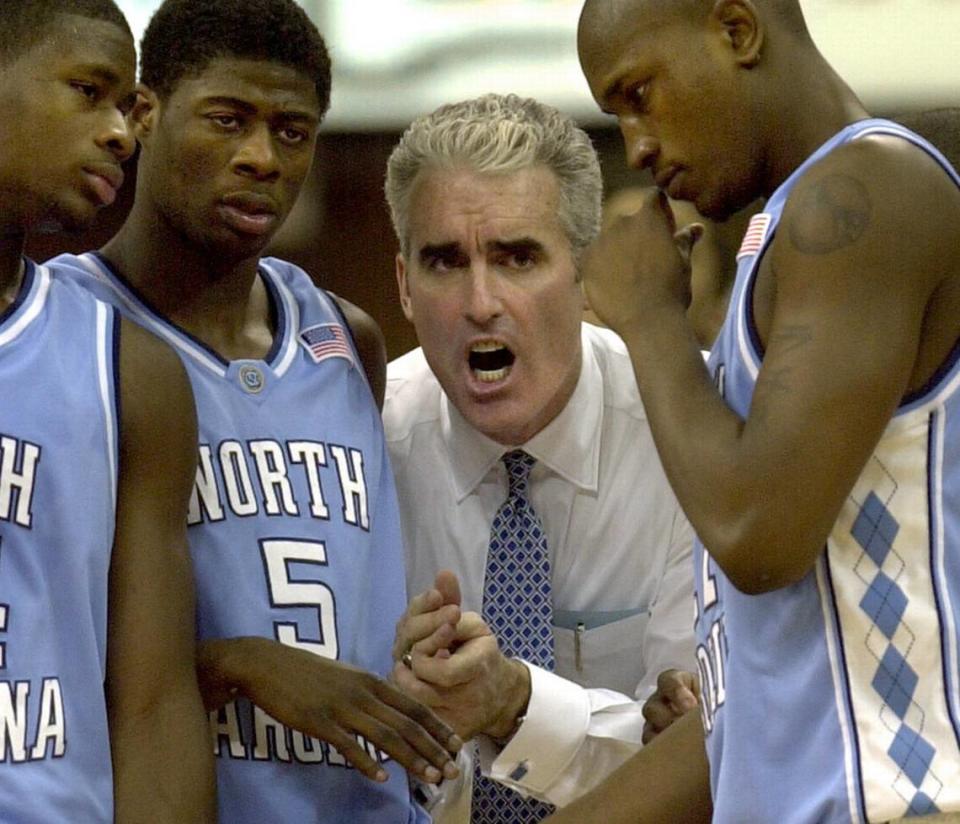
SF: You write about your intensity a lot, and how sometimes you went too far. We see you in the book punching whiteboards and hurting your hand, or getting mad because the band isn’t going to show up to a Notre Dame game, or saying that UNC had a reputation as a “soft” program when you came back to Chapel Hill and you needed to instill some toughness. Do you think you should have tamped down your temper at UNC?
MD: I like to think that there was calculated emotion as opposed to reactionary temper. Sports is an emotional event. Look at coaches like Roy Williams, like Mike Krzyzewski, like Tom Izzo. Talk about emotion — those guys are fiery.
So I wanted to bring out the emotion and energy in my team and the program that I felt was lacking in the past. At Notre Dame, that spirit was welcome. At North Carolina, it was a little bit of a shock to the system.
And your biggest strength can be your biggest weakness. If you’re too intense, you could cross that line and be too hard on your players. ... Or you could be too hard on the referees, or you could be too hard on an administrator. So that’s where I talk about understanding yourself as a leader and mining for the truth. ... As you get older, you know yourself better.
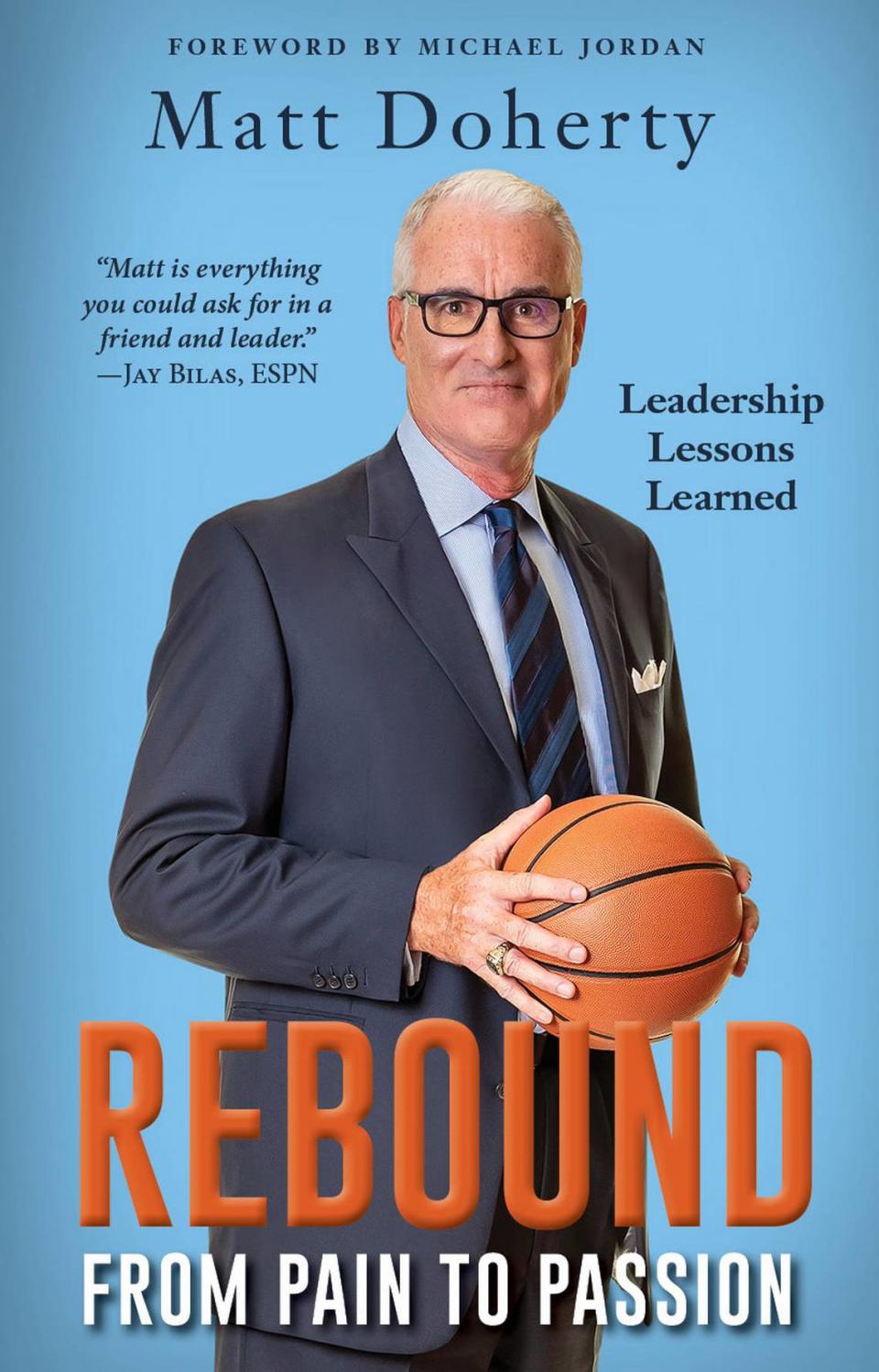
SF: What was the most difficult part of this book to write?
MD: I didn’t want it to be a tell-all, slanderous book. I wanted it to be a constructive leadership book, to keep it on that track. I also didn’t want to leave out anyone — a teammate, an important figure that helps you in a time of need. ... I wanted to share anecdotes that tell a story. But I don’t want anybody to get mad.
I don’t want to disrespect anybody like Dean Smith, Roy Williams or Dick Baddour. I didn’t want to be disrespectful to those men. I wanted to tell the story, state some facts and say: “This is what happened.” And hopefully I do that.
Matt Doherty’s new book “Rebound: From Pain to Passion” will have a virtual launch party on Zoom, moderated by Landis Wade and hosted by Charlotte’s Park Road Books, at 6:30 p.m. on March 2nd. Call the store at 704-525-9239 for more information.
